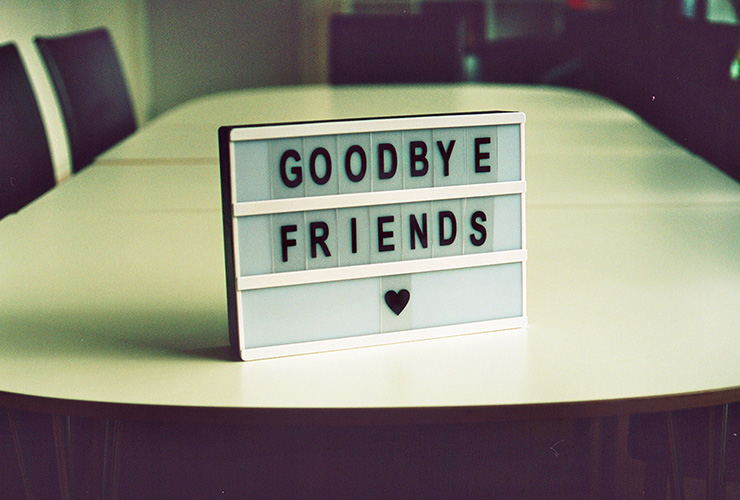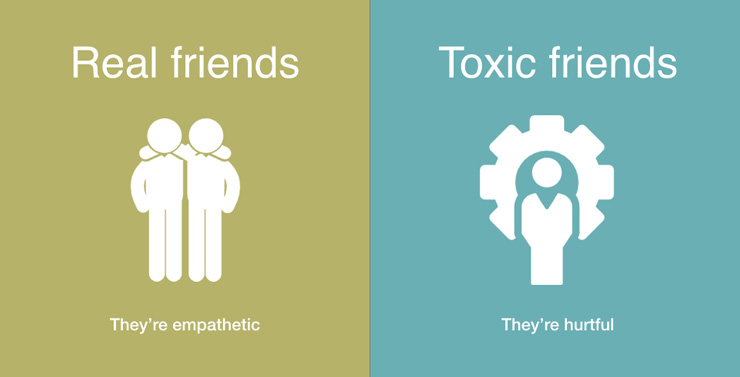
We all attract relationships for various reasons. It’s important self-care to discern who feeds our spirit and wellbeing — and let go of those who don’t
—
Humans, by nature, are social animals. It is as essential to have friends as it is to have a family. Friends can guide and support us at every stage. Our friendships can have a tremendous impact on our lives; that’s why it matters who we chose as our friends.
Friendship and social support have been linked to better physical and mental health, a greater overall sense of happiness and even a longer lifespan. But a good friendship requires a healthy balance between both parties — the needs of both individuals should meet.
Not all friendships are beneficial. Toxic friendships can leave you feeling drained, unsatisfied, and often unequal. They can be unhealthy for us and can deteriorate our mental health. It’s important to know who are your real friends and who the toxic ones are. So, what makes someone a ‘toxic’ friend?

Here are some common traits that a ‘toxic’ friend can have.
You aren’t able to trust them
Friends are the ones with whom we can comfortably share our secrets. We can rely on them and feel safe with them. If we have to think twice before speaking any word in front of them or we feel afraid while opening up with them about our life, it’s a red flag. If we find ourselves doubting their intentions, it’s a red flag. If they make us feel emotionally unsafe, it’s a red flag. Time to reconsider that ‘friend’.
They try to compete with you
Good friends are your supporters. They champion your ambition and your potential. At some point in life, if you find your friend copying your work, your talent or your style, and you sense that he/she is trying to compete with you on some level — red flag. This ‘friend’ may more likely become an enemy, or at best, a nuisance in your life.
You give more than you get
I know it always makes us happy when we give our friends gifts or offer them help. But we must keep a healthy balance of giving and taking in our friendships. If we don’t, we might end up feeling used. If we are the only ‘giving’ side and the other party isn’t reciprocating, we might end up feeling unappreciated as well. Such a friendship can erode our self-esteem in the long run.
They spread rumors about you
We all feel bad when we hear negative things about ourselves or our lives which are untrue. It can be even more hurtful when we hear such stuff from our friends. If we hear any rumors about ourselves that originated from our friend — it’s time to distance ourselves from him/her. And if we catch them red-handed, then we should confront them to protect our integrity and cut that rumor mill off at the pass.
They put you down
Friends should be your biggest cheerleaders. They should be the ones who build your confidence, not the ones reminding you of your insecurities. If they embarrass you in public, if they point out your mistakes or make fun of you in front of your other friends, colleagues, and family, then they aren’t your well-wisher or friend — time to say goodbye.
They play blame games with you
Manipulation is emotionally unhealthy, and we don’t expect our friends to take part in it. When your friend regularly blames you (or even others, which can also make you feel unsafe) and never takes any responsibility for his/her actions — that is a sure sign that this person is not a true and supportive friend.
You don’t enjoy their company
This may seem obvious, but it’s all too common that people hang with others who they don’t necessarily enjoy, perhaps motivated by status, opportunity or a desire to offer someone emotional support. But if we observe negative traits in our new friends that make us feel uncomfortable, or we find them toxic to others, then we should keep them at a distance.
In relationships of all kinds, learn to trust your intuition. Your inner voice will always guide you to knowing who will feed you — and who will detract from your energy and spirit. Follow that voice and surround yourself by people who light you up and make you feel good! And let go of the rest.
You may also enjoy reading Sisterhood: Giving Thanks for Your Girlfriends by Alena Chapman